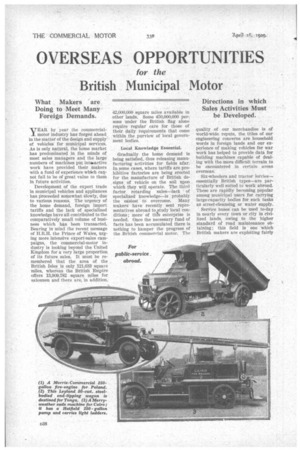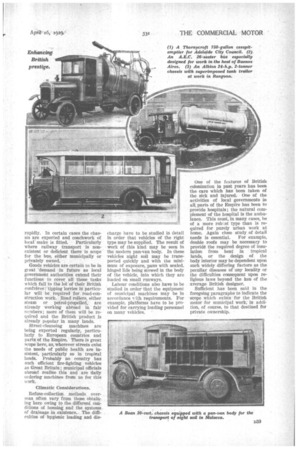OVERSEAS OPPORTUNITIES
Page 124

Page 125

If you've noticed an error in this article please click here to report it so we can fix it.
for the
British Municipal Motor
ATEAR by year the commercial motor industry has forged ahead in the Matter of the design and supply of vehicles for muniCipal services. As is only natural, the home market has predominated in the minds of most sales managers and the large numbers of machines put interactive work have provided their makers with a fund of experience which cannot fail to be of great value to them in future activities.
Development of the export trade in municipal vehicles and appliances has proceeded somewhat slowly, due to various reasons. The urgency of the home demand, foreign import tariffs and the lack of specialized knowledge have all contributed to the comparatively small volume of business which has been transacted. Bearing in mind the recent message of HIM. the Prince of Wales, urging more intensive export-sales campaigns, the commercial-motor industry is looking beyond the United Kingdom for a very large proportion of its future sales. It must be remembered that the area of the British Isles is only 121,633 square miles, whereas the British Empire offers 13,909,782 square miles for salesmen and there are, in addition, 42,000,000 square miles available in other lands. Some 450,000,000 per sons under the British flag alone require regular care for those of their daily requirements that come within the purview of local government bodies.
Local Knowledge Essential.
Gradually the home demand is being satisfied, thus releasing manufacturing activities for fields afar. In some cases, where tariffs are prohibitive factories are being erected for the manufacture of British designs of vehicle on the soil upon which they will operate. The third factor retarding sales—lack of specialized knowledge—is probably the easiest to overcome. Many makers have recently sent representatives abroad to study local conditions; more of Os enterprise is needed. Once the necessary fund of facts has been accumulated there is nothing to hamper the progress of the British commercial motor. The
quality of our merchandise is of world-wide repute, the titles of our engineering concerns are household words in foreign lands and our experience of making vehicles for war work has helped to provide data for building machines capable of dealing with the more difficult terrain to be encountered in certain areas overseas.
Six-wheelers and tractor lorries— essentially British types—are particularly well suited to work abroad. These are rapidly becoming popular among municipal users for carrying large-capacity bodies for such tasks as street-cleansing or water supply.
Service buses can be used to-day in nearly every town or city in civilized lands, owing to the higher standard of road maintenance obtaining; this field is one which British makers are exploiting fairly rapidly. In certain cases the chassis are exported and coachwork of local: make is fitted. Particularly where railway transport is nonexistent or deficient there is scope for the bus, either municipally or privately owned.
Goods vehicles are certain to be in great "demand in future as local government authorities extend their functions to cover all those tasks which fall to the lot of their British confreres; tipping lorries in particular will be required for road-construction work. Road rollers, either steam or petrol-propelled, are already working abroad in fair numbers; more of them will be required and the British product is already popular in many lands.
Street-cleansing machines are being exported regularly, particularly to European countries and parts of the Empire. There is great scope here, as, wherever streets exist the needs of public health are insistent, particularly so in tropifal lands. Probably no country . has such efficient fire-fighting vehicles as Great Britain; municipal officials abroad realize this and are daily ordering machines from us for this work.
Climatic Considerations.
Refuse-collection. methods overseas often vary from those obtain lug 'here owing to the different conditions of housing and the systems of drainage in .existence. The difficulties of hygienic loading and dis
charge have to be studied in detail in order that vehicles of the right type may be supplied. The result of work of this kind may be seen in the modern pan-van body. In these vehicles night soil may he transported quickly and with the minimum of exposure, pans with sealed, hinged lids being stowed in the body of the vehicle, into which they are loaded on small runways.
Labour conditions also have to be studied in order that the equipment of municipal machines may be in accordance with requirements, or example, platforms have to be provided for carrying loading personnel on many vehicles. • One of the features of British colonization in past years has been the care which has been taken of the sick and injured. One of the activities of local governments in all parts of the Empire has been to provide hospitals; the natural complement of the hospital is the ambulance. This must, in many cases, be of a more rofrst type than is required for purely urban work at home. Again close study of detail needs is essential. For example, double roofs may be necessary to provide the required degree of insulation from heat in tropical lands, or the design of the body interior may be dependent upon such widely differing factors as the peculiar diseases of any locality or the difficulties consequent upon religious laws 'beyond the ken of the average British designer.
Sufficient has been said in the foregoing paragraphs to indicate the scope which exists for the British motor for municipal work, in addition, of course, to that destined for private ownership.








































































































































































































